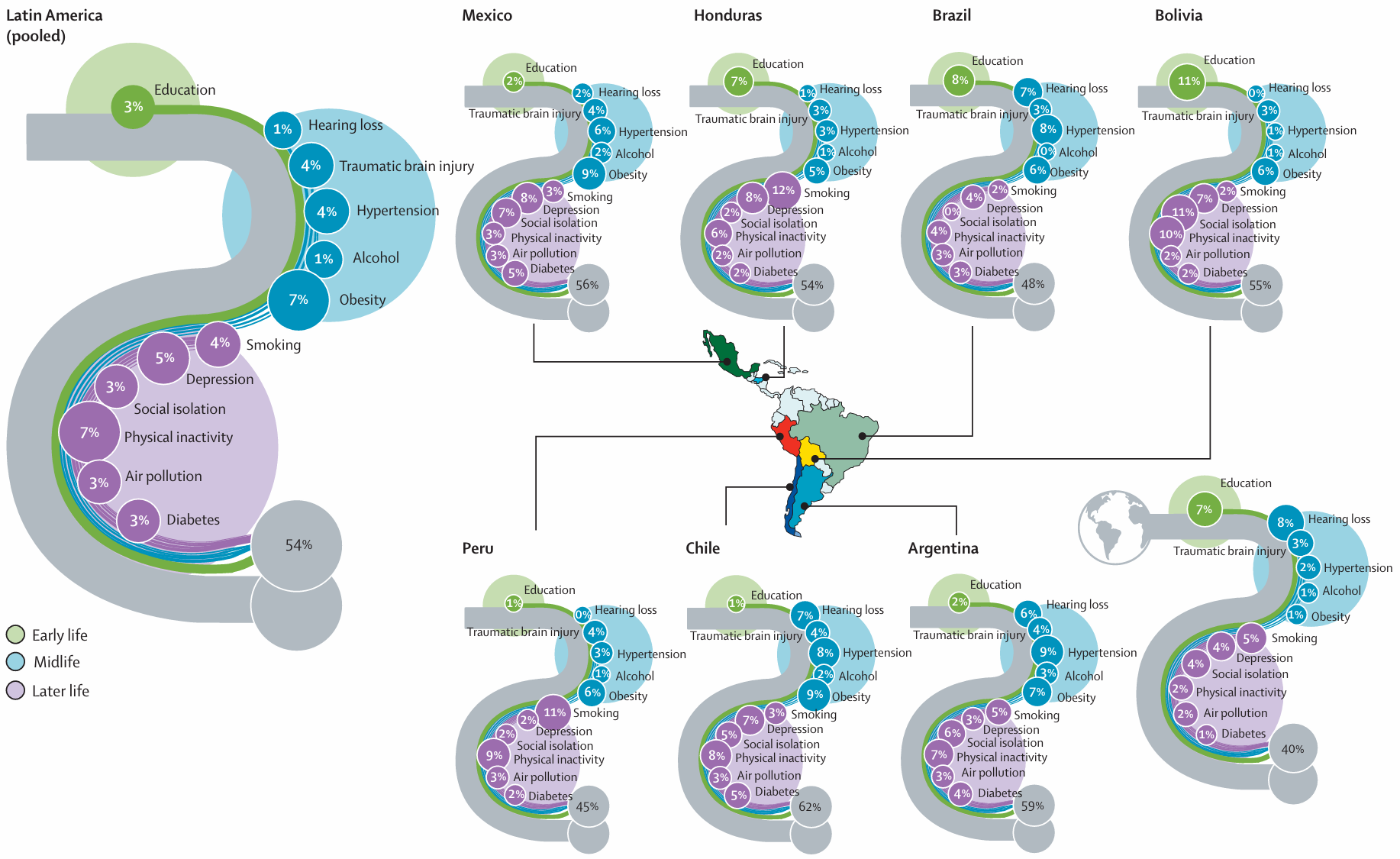
Introduction
Dementia prevalence in Latin America stands at 8.5%, the highest globally, and is projected to reach 19.3% by 2050. This sharp increase is driven by an ageing population, cardiovascular risk factors, low education levels, and social inequalities. Addressing modifiable risk factors for dementia is crucial in this context. Researchers aimed to calculate the Population Attributable Fractions (PAFs) for 12 modifiable risk factors using data from seven Latin American countries: Argentina, Brazil, Bolivia, Chile, Honduras, Mexico, and Peru. This information is vital for informing policies aimed at dementia prevention in the region.
Key Modifiable Risk Factors
This study revealed that 54% of dementia cases in Latin America could be avoided by targeting 12 modifiable risk factors. This percentage surpasses the global estimate of 40%. The major contributors in the meta-analysis were obesity in midlife, physical inactivity in later life, and depression.

Obesity
Obesity emerged as a significant risk factor, with PAFs consistently exceeding global estimates in all seven countries. The highest PAFs were observed in Mexico (9.4%) and Chile (8.8%). More than 50% of women in Latin America are overweight or obese, and two-thirds of women and over half of men are overweight or obese in Chile and Mexico. The rise in obesity is linked to increased consumption of ultra-processed foods and reduced intake of fruits, vegetables, and whole grains. Efforts to promote sustainable agricultural practices and policies supporting local food systems could help address these challenges.
Physical Inactivity
Physical inactivity PAFs were also high, particularly in Bolivia (10%) and Peru (9%). Lifestyle habits significantly influence these factors. Poor diet and physical inactivity are upstream risks for vascular diseases, leading to obesity and cardiovascular diseases that contribute to cognitive impairment. Obesity often co-occurs with insufficient physical activity, leading to higher rates of diabetes and hypertension. These non-communicable diseases are associated with neurodegeneration and systemic inflammation.
Mental Health and Depression
Depression is another critical factor, with PAFs ranging from 1.7% in Peru to 8.5% in Mexico, compared to the global estimate of 3.9%. Depression carries the highest relative risk for dementia and links with cardiovascular risk factors. It also ties to immune dysregulation and the accumulation of biomarkers related to Alzheimer’s disease. Moreover, it results in changes in brain structure. Variations in mental health awareness, stigma, and healthcare infrastructure contribute to the observed disparities in depression prevalence across the countries.
Education and Smoking
PAFs for less education were low in Argentina, Chile, Mexico, and Peru, not exceeding 2%. In contrast, Brazil and Honduras had PAFs consistent with global estimates (7%), while Bolivia had the highest PAF (11%). Despite progress in education over the past three decades, regional inequalities persist, particularly in low-income populations.
Smoking PAFs varied significantly, with the highest in Honduras (12%). Despite stringent laws prohibiting smoking in public areas, additional regulations might be needed to mitigate tobacco use. Implementing a 50% increase in cigarette prices through taxes could lead to a substantial reduction in deaths and disabilities attributed to smoking.
Policy Implications and Future Directions
This study highlights the importance of targeted interventions for dementia prevention in Latin America. While complete elimination of risk factors might not be feasible, identifying targets enables better management and prevention approaches. Population-level strategies, such as campaigns promoting healthy eating and regular physical activity, and increasing regulations or taxes on unhealthy foods and tobacco, would reduce exposure to such risk factors.
Ongoing randomised clinical trials like the Latin American Initiative for Lifestyle Intervention to Prevent Cognitive Decline will be crucial for providing evidence on risk reduction strategies at the individual level. Moreover, incorporating air pollutant concentration measures and better methods for assessing social isolation and traumatic brain injury will enhance future studies.
Findings clearly demonstrates the need for policies prioritising midlife obesity, late-life physical inactivity, and depression as initial targets for dementia prevention strategies. Addressing these factors could significantly reduce the dementia burden in Latin America.
Conclusion
In conclusion, 54% of dementia cases in Latin America could be prevented by mitigating 12 modifiable risk factors. This proportion varies from 45% in Peru to 62% in Chile, exceeding the 40% worldwide estimation. Midlife obesity, late-life physical inactivity, and depression are prominent contributors. These findings are vital for policy makers to develop effective dementia prevention strategies in Latin America and ensure healthy ageing for their populations.
